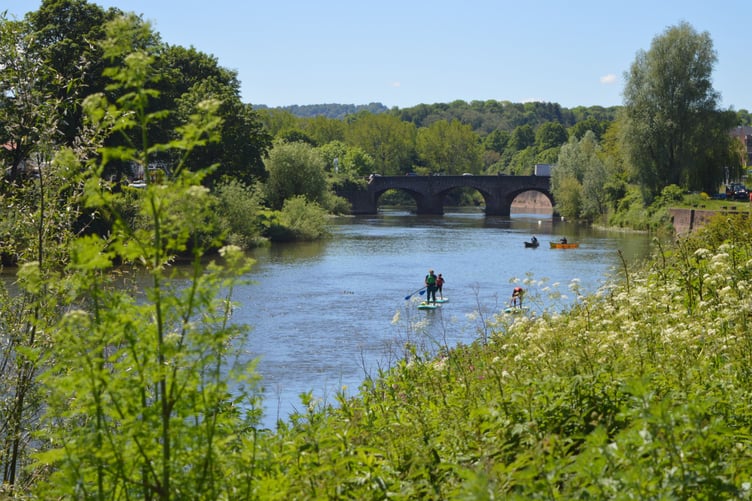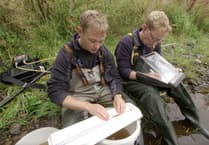A FOOD producer at the centre of protests over River Wye pollution has announced an overhaul of its manure management strategies on poultry farms.
Responding to environmental concerns, Hereford-based poultry giant Avara has told its suppliers that manure from its supply chain will no longer be sold as fertiliser within the river’s catchment.
It says the measure is a proactive attempt to reduce phosphate run-off into the Wye, a major contributor to its deteriorating health.
The decision follows intense scrutiny of the company’s environmental impact, notably from groups such as Marches Climate Action (MCA), Save The Wye, and Friends of the Upper and Lower Wye.
These organisations recently led a robust campaign against supermarket giant Tesco, drawing attention to the retailer’s association with Avara Foods and the subsequent impact on the Wye.
Nick Day of Friends of the Lower Wye said of the latest statement from Avara CEO Andy Dawkins: “Great news for the future from Avara, but no firm dates. Every further week’s delay is a further two million chickens – 3,000 tonnes of Avara manure, and a load more phosphate.
“I welcome the announcement and hope that implementation will not meet with any delays?”
Avara’s new measure also features a pilot for farms wishing to use their poultry litter on their lands, ensuring that they adhere to rigorous Red Tractor assurance standards, centring around soil and nutrient management.
While still in the developmental phase, the firm claims it will help foster good agricultural practices, aiding in sustainable soil and nutrient conservation. It says it is determined to set a precedent for litter management in the region and support a circular economy, maximising value from poultry litter in an environmentally friendly manner.
The food giant adds that it has collaborated with Gamber Poultry Litter Limited to facilitate the change, ensuring that the litter previously sold as fertiliser within the catchment will now be directed to Gamber to be redirection away from the Wye catchment.
Gamber’s role includes providing full traceability for litter sales, fortifying Avara’s commitment to environmental protection, says the company.
Avara adds that the move aligns with its previous statement emphasising the importance of collective action and acknowledges its duty in enhancing the river’s quality.
And it says its recent changes reiterate its dedication, as they set their sights on ensuring their supply chain isn’t a part of the problem by 2025.
But they also call on other stakeholders to contribute towards improving the river’s health, stressing the need for a collective response to tackle the challenges the River Wye faces.
Litter management in the River Wye Management Catchment
This is the full statement release by Avara foods
On Thursday 10th August, we outlined some changes to the way that your poultry manure will be managed within the River Wye Special Area of Conservation, comprising the sub-catchments of the Upper and Lower Wye, and the Lugg. I wanted to confirm, in writing, what those changes are and why they have come about, to avoid any confusion. As ever, if you do have questions or concerns, I’d encourage you to contact one of the Avara team, or me, and we’ll be more than happy to discuss.
In short, litter from the Avara supply chain will no longer be available for sale, as fertiliser, within the Wye catchment. This is alongside a pilot of new assurance standards for any farm wishing to use their poultry litter elsewhere on their farming estate.
The primary reason for this change is, I would hope, self-evident. The continued deterioration of the Wye has been well reported and, while the root causes are many and complex, the role of phosphate, from poultry litter in particular, has been the focal point of many campaigns. As the largest poultry business in the region, the onus is on us to manage our supply chain, set an example for others and to use what influence we have to support change elsewhere in the catchment. You will hopefully have seen our roadmap and understand our commitment to make sure that our supply chain is demonstrably not part of the problem by 2025.
Our long-term aim is unchanged: to support sustainable solutions within the catchment that contribute to circular economies and create additional value from poultry litter. Clearly, these are taking some time to develop, and we are in a position where we need to act urgently, while the long-term solutions come to fruition.
As part of our proposal to change the management of litter within the catchment we have agreed Head of Terms with Gamber Poultry Litter Limited. Our next step will be to vary our contracts with our in-catchment farmers, so that any litter you currently sell as fertiliser within catchment is instead sold to Gamber, who will find alternative destinations. Gamber will provide us with full traceability over the sale of your litter, so that we can be confident it is not directly contributing to the problems in the Wye.
At the same time, the 25-30 farms in our supply chain that also have arable land and wish to use their litter as fertiliser, will be part of a pilot group, trialling a new Red Tractor assurance standard built around soil and nutrient management. While these standards are still in development, they will provide an enhanced level of rigour, evidence of good practice and important insight that we hope will speed up the development and implementation of finalised standards that will be available to the wider farming community. Once available, we expect that the standard will be widely adopted, and will be a prerequisite for any future sales of litter within the catchment: supply will be contingent on successful audits and demonstrable good practice.
Unfortunately, there is nothing that we can do to stop the buying market for your litter from choosing fertiliser from elsewhere, nor change the way in which it is used. We have been clear from the start that our contribution and influence over the issue is limited, and that others in the catchment need to act. Hopefully, the actions we’ve announced will inspire others to follow suit.
Please be under no illusion that this limited action will be enough on its own to reverse the health of the river. We are well-aware of the limited impact of our supply chain in the region and that the river will only return to health when everyone discharging phosphate to the land or water changes the way they operate, and when the many other root causes are addressed.
Finally, I want to assure you that we know and understand the likely consequences of our proposals for agriculture in the region. Hopefully, you equally understand the likely consequences if we were to do nothing.
Thank you for your continued support, understanding and contribution.
Andy Dawkins; CEO, Avara Foods





Comments
This article has no comments yet. Be the first to leave a comment.